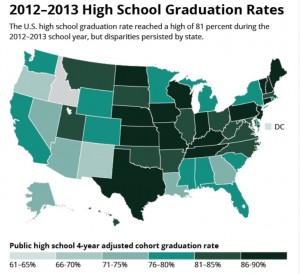Dear Commons Community,
U.S. students are graduating from high school at a higher rate according to new data from the U.S. Department of Education’s National Center for Education Statistics. The nation’s high school graduation rate hit 81 percent in 2012-13, the highest level since states adopted a new uniform way of calculating graduation rates five years ago.
“America’s students have achieved another record-setting milestone,” said Secretary of Education Arne Duncan in the statement. “We can take pride as a nation in knowing that we’re seeing promising gains. This is a vital step toward readiness for success in college and careers for every student in this country.”
The data provided by NCES indicated that graduation rates varied from state to state as illustrated by the map above. Iowa had the highest graduation rate — 90 percent — while the District of Columbia had the lowest rate at 62 percent.
The Education Department’s data does not show how the rates may have varied among subgroups of students. The department’s statement says this data should be released in the coming weeks. As reported in The Huffington Post:
During the 2011-2012 school year, 84 percent of girls graduated high school in four years, compared to 77 percent of boys. Sixty-nine percent of black students graduated in that year, compared to 86 percent of white students.
On Wednesday, The Schott Foundation for Public Education released a report estimating that 59 percent of black males graduated from high school in the 2012-2013 school year, although the group itself notes that these are just estimates. The foundation arrived at these figures by compiling previous Department of Education data and previous data from its own reports and applying a moving average.”
Congratulations to our teachers, principals, and students!
Tony




